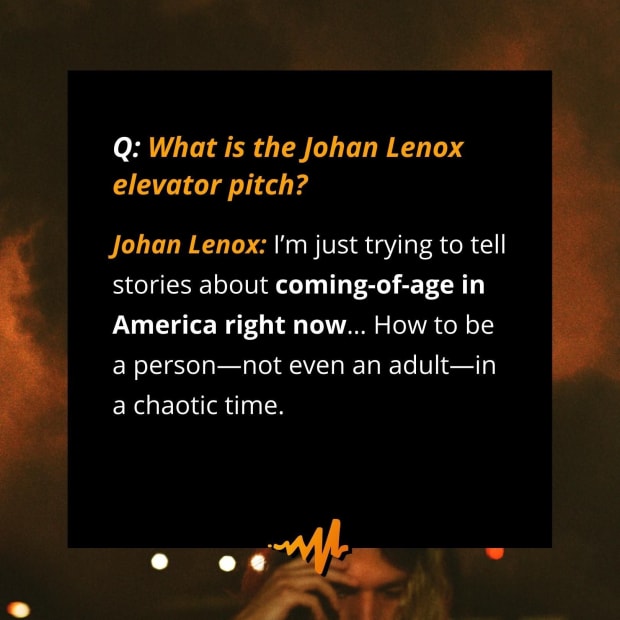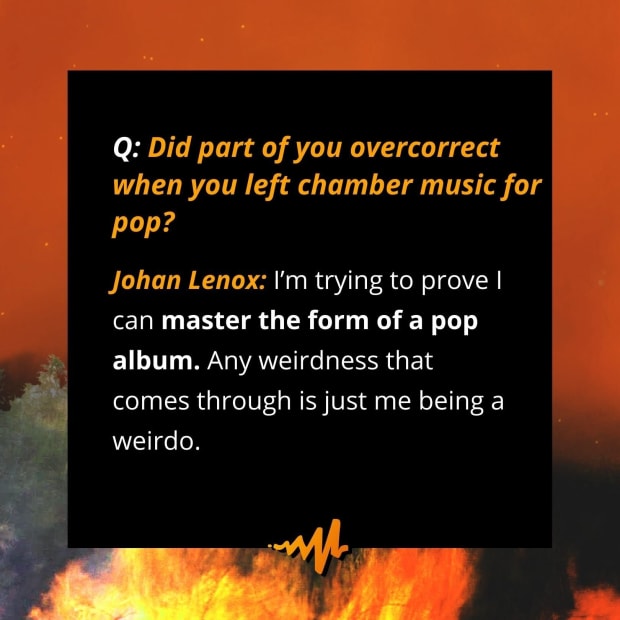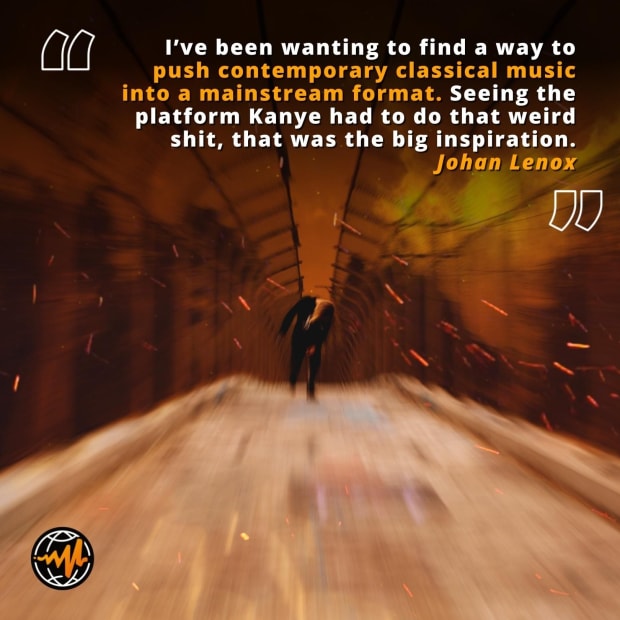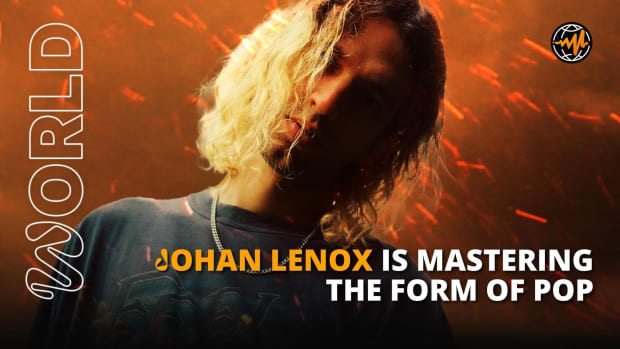After working with Kanye West, composer and singer Johan Lenox is stepping into his pop era. He breaks down his journey for Audiomack World.
Photo Credits: Nate Guenther, Brendan Bleecker
This article previously appeared on Audiomack World.
Johan Lenox’s name has been attached to production credits for Kanye West, Big Sean, and other A-list names in hip-hop. While he was building up his name as the strings guy for these massive acts in LA, the composer was also finding his sound as a solo pop artist, spurred on by discovering Yeezus at a party during the tail end of his time at the Yale School of Music.
“[Yeezus] felt like it was doing a lot of what I loved about classical music, but for a way bigger audience and with more impact on culture,” Johan recalls. “Since high school, I’ve been wanting to find a way to push contemporary classical music into a mainstream format. Seeing the platform Kanye had to do that weird shit, that was the big inspiration.”
A lot of his early tunes have been scrubbed from the internet, but every step taken—including working on Yeetoven, which combined Ye with Beethoven into a 50-plus piece symphony—helped Johan discover a passion for the form of pop music.
“I didn’t start out as a singer,” Johan tells Audiomack World. “I started out as a composer. Figuring out how to sing vocals in a way that has real feeling and feels personal, instead of correct and clean, has been a process. I had to go back and let weirdness back in because they were a little too perfect at one point.”
This practice of allowing in imperfection led to Johan Lenox re-tracking his vocals and taking his time crafting his debut album, WDYWTBWYGU, out today. The record’s title, which stands for “What Do You Want To Be When You Grow Up,” matches the underpinnings of stress that mark each song. “It’s a question that usually you ask a kid, but I’m still asking it and I think a lot of people are,” Johan says. The album is also driven by huge choruses and intriguing textures. Every time Johan reaches for an anthemic moment or a cheeky one-liner, he nails it.
WDYWTBWYGU’s grandiose sounds exist to prove a point: Johan Lenox can write a proper pop hook. After years of working on chamber music, the transition to pop felt freeing. “The form around pop music is much more rigid than classical music, at this point,” he explains. “Classical music is much more experimental. But a chorus is still a chorus—things exist. Not in classical music.” That dash of structure, some great features, and perceptive writing make Johan’s debut album a strong argument for his having mastered the making of the pop album.

What is the Johan Lenox elevator pitch?
Oh, God. I’m just trying to tell stories about coming of age in America right now. Trying to figure out how to be a person—not even an adult—in a chaotic time.
Obviously, I make substantial use of my orchestral background. There’s no synths or guitars on the album. It’s all cellos, violins, drums, and vocals. Beyond that, flutes and bassoons. For a while, I was figuring it out, but that’s the thing I already know how to do well. But there was a period when I wasn’t using that as a tool in my own music.
Did part of you overcorrect when you left chamber music for pop?
Yup. That’s also interesting because I really do like—especially coming to it late in life—pop music. I like big choruses. I tried to show that I can write that stuff. Songs, for the most part, for this album, are pop songs dressed up in other stuff. Sometimes, people are like, “You’re combining classical and hip-hop here!” Which is something I’ve done in other contexts. But I don’t see this [album] as boundary-smashing music. From my perspective, I’m trying to prove I can master the form of a pop album. Any weirdness that comes through is just me being a weirdo.
How do you go from Yeetoven and chamber music to a pop album?
Immediately after school, the plan was to become a producer-singer and follow in [Kanye’s] footsteps. I got a copy of Logic and taught myself from YouTube videos and went straight to LA, trying to just learn the industry and get into sessions surrounded by people doing cool shit. I got connected pretty quickly but wasn’t figuring out what I was about as a musician.
The whole time I was producing music as myself, just trying to find a sound. All those steps along the way—working with Kanye was a pretty brief experience—got me to today. COVID also had a big impact. The album would’ve come out a year and a half ago, but [COVID] forced me to slow down. The decision to re-track the vocals was a big one.
What goes through your mind when you’re composing for yourself? As in, are you falling back on lessons from school, or do you say “Fuck that” and do your own thing?
I had a good test of this last week. I’m opening for 070 Shake, and she wanted me to have 25 minutes of pure chamber music, which is insane. I had to force myself to write that in a day last week. But I think the best teachers I had, especially towards the end, David Lang [taught me] to be as weird as possible and to keep away from the things that are predictable.
The debut album is driven by the anxiety of growing up. How do you turn stress into creativity?
I genuinely don’t know what to make of a lot of stuff, and I’m trying to figure it out. A lot of the lyrics on the album are very “I’m fine with it.” As much as it is anxiety-ridden, there’s a lot of apathy. Maybe underneath that, it’s, “Is he really stressed?” But I’m working through it. I don’t know that I’m worried, but I am curious.

You have some great features on this album: Cousin Stizz, 070 Shake, RMR. What does collaborative work bring out of you?
There’s been every combination of ways of making these features happen. I collab’d with producers, also. “Phases” and “You Up?” I did entirely myself, but a lot of the other [productions] started out as collaborations and I value that.
In terms of features, some of them I got audio in a text. Because I wasn’t in a room directing it, you get back something great but it requires me to rethink the production and make it make sense musically. Lancey [Foux], we did it in person, but I ended up restructuring the song afterward. The Thouxanbanfauni one, I totally re-produced the verse once I got his feature back.
How do you learn to let go? Especially when there’s the art, and then the response to the art?
It’s mostly being so fucking busy. I’ve got so many projects, and I’m trying to tour. We gotta figure that out. It’s hard for me to dwell—it’s not very philosophical, but it’s the practical reality. I always focus on the future.

Photo Credits: Yenny Hsieh, Brendan Bleecker
The other half of it is, let’s say you decide you wanna do a totally different thing. For years, the thing you’re trying to do isn’t as successful and the comments are, “Hey, maybe you should stick to the thing you used to do?” That’s where it’s been for me. I was lucky to have the success in this other realm [of production], and you can lean into it, or you can take a risk and build another thing up.
Go to Source
Author: Donna-Claire Chesman
